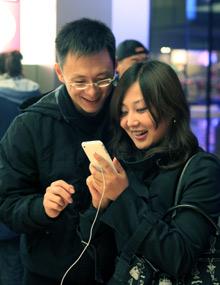China Unicom's high pricing strategy for Apple Inc's smartphone seems to have paid off at least for now after the company reported better-than-estimated iPhone sales yesterday.
Industry analysts are, however, skeptical on whether the gamble would pay off in the long run as they expect sales to taper after the initial enthusiasm wanes.
To date, China Unicom has sold nearly 100,000 iPhones after it was officially launched in China on Oct 30.

Customers checking out an iPhone at an Apple outlet in Beijing. China Unicom has said more and more customers are buying the iconic smartphone. [China Daily]
Industry analysts had at that time suggested that the company's high pricing strategy and the absence of WiFi functions in the handset would keep iPhone sales depressed.
"We did not expect such robust figures," said Flora Wu, analyst from domestic research firm BDA China. She feels that the high pricing strategy has actually prompted higher grey market sales.
While there are still no independent sources to verify the figures, market tracker GFK estimates that Unicom had sold nearly 70,000 iPhones by last month. The official figures are likely to be announced by the end of the month.
Yi Difei, spokesman from Unicom, told China Daily yesterday that nearly 71 percent of iPhone users chose to sign two-year contracts with the carrier. The sales number, he said, did not include inventories in the company's distribution channels.
According to GFK, over 13 million cellphones are sold in China every month and smartphones account for over 12 percent of the total.
"If Unicom's figures are reliable, then iPhone has become popular in China," said Sun Kai, an analyst from GFK. He said monthly shipments of the best-selling smartphones in China, such as Nokia's N series handsets, are about 100,000.
According to Unicom, an iPhone without a service contract costs as much as 6,999 yuan ($1,025) in China, compared with $299 in the United States. The handset that Unicom provides does not have the WiFi function, that enables users to get free access to the Internet in places such as cafes and airports.
These limitations saw Unicom signing up only 5,000 iPhone users during the first two days of the launch. In comparison, nearly 1 million iPhones were sold in the first three days when the latest model was launched in North America and Europe in June.
Since last month, Unicom has also launched aggressive advertising campaigns to promote the iPhone. The company is also believed to have imposed stiff sales targets for employees, who also stand to lose bonuses if they fail to achieve the numbers. Company officials, however, denied of the existence of such a plan.
Wu from BDA China said yesterday that even if Unicom's sales figure is reliable, it would be difficult to maintain the tempo. "The future of iPhone in China will depend heavily on whether Unicom will change its current strategy," she said.





